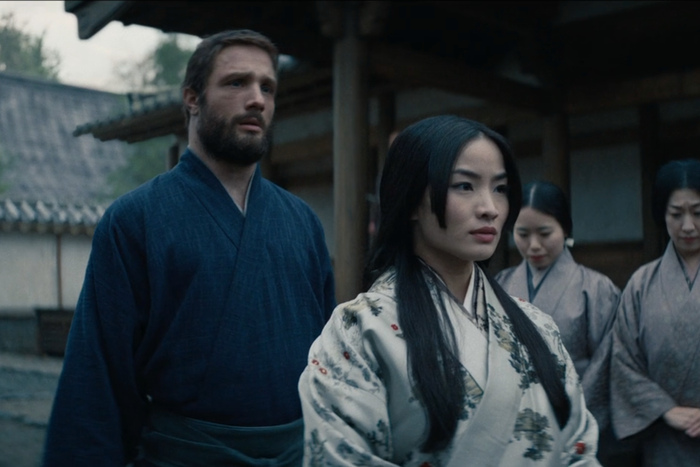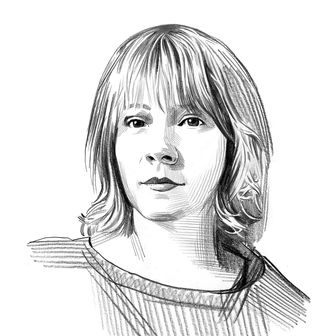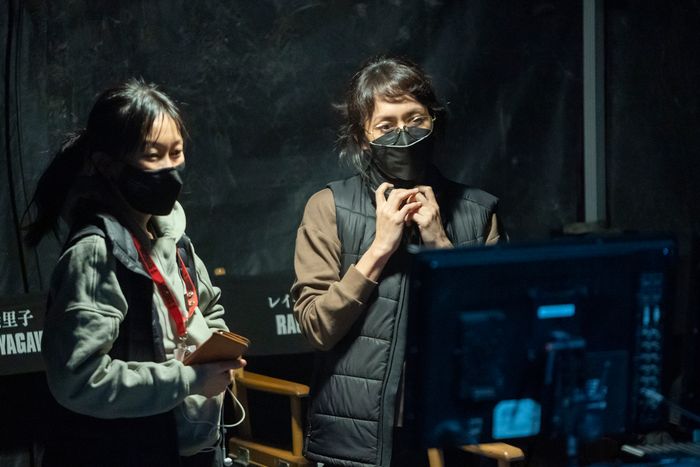
Shōgun is a show about fate. About cross-cultural differences, statecraft, chaos, about war never changing, and about getting my ship the Erasmus back. But most importantly, it’s a show about communication. Court etiquette of the Sengoku era, as well as the gender politics of the time, mean a lot of things cannot be said explicitly. Even if you speak the same language as someone, you can never fully know them, and yet you all have to work together toward a common goal.
The making of Shōgun mirrored these themes in many ways. As a cross-cultural production — shot in Canada, produced by Hollywood, filled with Japanese actors — interpretation was key. Enter Eriko Miyagawa. The producer worked closely with lead actor/producer Hiroyuki Sanada to ensure the show was accurate to period Edo yet still relatable to modern Tokyo. From consulting on translating English scripts for Japanese actors, to translating the show’s press kit, to serving as interpreter for multiple interviews with Vulture, she wore many hats and was gracious enough to answer all our questions about how Shōgun was interpreted from English book to Sengoku Japan and back.
Can you start by telling me some of the things that you did as a producer on Shōgun and how that differed from previous experiences in which you were just consulting?
I think the main difference is the sheer volume. I’ve done all sorts of things. I started as an on-set interpreter. My first job was Kill Bill. Since then, I’ve been servicing mostly American shows with Japanese elements. But when the volume is so big and comprehensive, like Shōgun, it becomes producing. On this show, Hiro and myself were brought on as producers from the get-go. We had access to the entire process; we were able to give input on all the different aspects of the show. That was quite different.
A lot of times on other shows there will be an American producer overseeing the show. I’ll consult in this department or we need this bit translated, and they sort of put it together. What was really great about Shōgun is that Hiro and I were able to see the entire process. Nothing fell between the cracks.
Tell me about the process of translating scripts into the various languages the show uses.
It needed to go through steps of polishing so that what ends up in the show feels authentic to native Japanese audiences. Obviously, James Clavell’s novel was based on rigorous research and passion for Japanese culture. So they had that to work from as a base, but the scripts went through layers of consultations to get it right. Then the American writers, they write the script. Then it goes to a team of Japanese translators in Tokyo. Hiro and I are checking in at different stages. Then it goes to Japanese dialogue polishers, who are experienced with Japanese period shows, to make sure it’s period-appropriate and feels natural for a human being to be speaking. Because you know, it happens a lot in dubbing, when dialogue is pretty much directly translated from another language and it just sounds like something that’s been translated. So we wanted to make sure it felt natural.
What’s great about a TV series is that the actors have the time to be able to really immerse in the world. They have their own opinions and input, so we just kept polishing until the moment we roll. When a script is translated, it’s not just one thing it could be. There are so many different options. There are so many ways to interpret one thing. There is a lot of conversation for every single line. It’s just exhausting.
As you were saying, some of the work that the Japanese translators were doing was specifically to keep it rooted in this period accuracy. It’s a work of translation not just into Japanese but into Sengoku-period Japan.
Ultimately, if they really speak how they spoke in that time, we wouldn’t understand it. So it’s a fine balance, which takes from a tradition of Japanese jidaigeki. Every jidaigeki made their own choices, depending on if they wanted to be a little bit more modern versus if they wanted to feel more classic. I think, generally, we went for the classic. But we were very careful because we really wanted a young Japanese audience who may not typically watch jidaigeki to be able to understand and enjoy it without any stress.
What’s your professional opinion of Mariko-sama as an interpreter? Was she good, or did she put too much of her own feelings into her translation?
[Laughs.] I think she’s a great diplomat. So she’s the best diplomatic interpreter. Toward the end, she sort of infused her opinions a little strongly, but I think she’s just a great interpreter.
When working on a translation, how much do you think about the audience as opposed to just trying to accurately represent what the actor is saying?
First of all, we try to be as close as possible, to be respectful to the script, and close to the intention of the writers as much as possible. They’re great writers and the text is so loaded with beautiful nuances and a great sense of humor. But there are things that are quite difficult to translate, sometimes. They’re not a natural part of our language or our culture. So it becomes a conversation, how to preserve that in the most realistic way. Also, and I think Anna spoke about this on one of her TV appearances, but Japanese text is longer. So a lot of balls were in the air.
Can you tell me more about Japanese text being longer?
Especially when you have to be polite — when you’re using the honorific, like when Mariko is talking to Toranaga — it starts to get a little longer. To say thank you, you have to be super polite, and at the end say these honorifics. It just becomes longer. Justin also wanted to be respectful, and he was kind of enjoying that process. I think Justin saw how he could incorporate that in the subtitles.
Your bio calls you “bilingual and bicultural,” which I love. Sometimes, like in the case of honorifics, the language barrier isn’t the site of miscommunication, sometimes the cultural barrier can be greater.
Totally, and they’re so intertwined. I like to be seen as bicultural. I’m familiar with different filmmaking processes. I’ve never worked on a project without interpreters present on set. That’s sort of my specialty: to work on projects with different cultures and different languages and sort of bridging that and moving things forward.
In previous interviews for which you’ve interpreted, the actors talked about how different they found the Shōgun set compared to Japanese productions. Is there anything you think that an American audience would be surprised to know about working in Japan versus working in the West?
Yeah, there’s a lot. But I think one of the important things, what Eita said, is that actors are more included in the process [on Shōgun]. I mean, every project is different. But I know that all the Japanese actors who’ve only worked on Japanese shows really appreciated how they’re much more a part of the process than they typically are in Japanese shows.
In Japan, there’s no union. So I think working conditions can be a lot tougher. That’s probably one of the big things. And I think there’s a lot longer of a development process, as well as prep time, in Hollywood shows. They allow more time for actors to prepare for the role, training. There’s just more time because there’s more money.
I want to get into some specific choices the show made with language that I’m hoping you have insight into. The choice of “pillow” as the euphemism for sex, how did that come about?
I think it’s from the book. I think I’ve heard it in Japanese jidaigeki.
I think I have too. But it was so insistent on the show. I was like, Wow, we’re just going with “pillow,” okay.
It’s a good euphemism.
And we talked about this with Eita a little bit, but one of his little poetic flourishes was translated to something like “trying to fuck a sunset.” And I was given to understand there isn’t really a swear word for sex in Japanese, nothing that has the stigma of “fuck.”
Yeah.
So what was being said there, that felt like “fuck” was what needed for the subtitles?
He just says … not even “make love to.” The Japanese euphemism for sex is “to hold tight.” Literally, it means “to hug.” So it’s not really as hard as the English.
It’s interesting that there isn’t necessarily a word for that activity that has the same boundary-pushing power in Japanese.
Definitely, that was super hard for translators. Who swears the most in our show, other than Blackthorne?
Maybe Yabushige? At least that’s what it looks like in translation.
Yeah, he does.
And what word is being used when people discuss fate on the show? What concept is that?
Most of the time the word shukumei is used. That basically means fate. There’s another word called unmei, which is more like destiny. There’s a couple of lines that use unmei because it’s a little bit lighter. In terms of nuance, shukumei is a bit more loaded. Shukumei is a very important concept for this show. I think we use it very selectively, in the right places.
I was reading the show’s official glossary, which is so cool that you have, and it says that shukumei is tied into Buddhism. So it’s interesting that even the converts on the show still hold onto that concept.
It’s also a part of Shintoism. Buddhism and Shinto are very present. They’re quite seamlessly intertwined with politics. Temples had a lot of power, certain relationships with lords. I think it is a Buddhist concept, but it might have a life of its own at this point.
Can you think of a specific time where the translation process was especially nuanced? That made you go, Wow, this really took some time, but we figured it out eventually.
Many. But, you know, you kind of forget the hard things. I think one kind of interesting, and a little bit controversial, example could be Ochiba’s line at the end of episode four. She is with Ishido and she, in a very Ochiba, passive-aggressive way, is like “Get things moving.” And at the end, the subtitle says “The council will answer to me.” Something like that. I think originally we had pretty much the direct translation of that line in Japanese, but it felt like she became a Disney villain or something. A Japanese woman of that stature wouldn’t say that, and also it felt a bit out of Ochiba’s character. I mean, that’s what she is really saying, that’s her intention. But she wouldn’t say that. So in Japanese she’s saying, “Let’s hear what they have to say.”
Japanese audiences, who are so familiar with these types in jidaigeki, are going to immediately understand that what she means is, “The council will answer to me.” But I think the subtitle needed to get more to the point. That was one of the more difficult choices that we needed to make. There are many of those on a smaller scale, many lines that needed to be deliberated and adjusted. But I thought that was a pretty interesting example of how different it can be.
Have you seen the memes where the whole joke is that Mariko is interpreting really asymmetrically? Like Blackthorne says a whole essay, and she translates a single sentence?
Yeah, it’s very Lost in Translation. Remember the scene where the commercial director’s telling Bill Murray many things, and then the interpreter goes, “more intensity”?
I do, yeah. You worked on Lost in Translation, right?
Yeah, but as a PA in prep.
I’ll say that, when you’ve been interpreting for me, I’ve been grateful for your concision. I know I yammer.
You’re thinking while you’re talking. Also I think sometimes interpreters are diplomats. I’m often involved with hiring and placing interpreters who work on set. Not only do they need to be skilled interpreters, but I think more importantly they need to be a good diplomat and be able to mediate as needed, to move things forward. For better or worse, it’s part of the job.
This interview has been edited for length and clarity.



